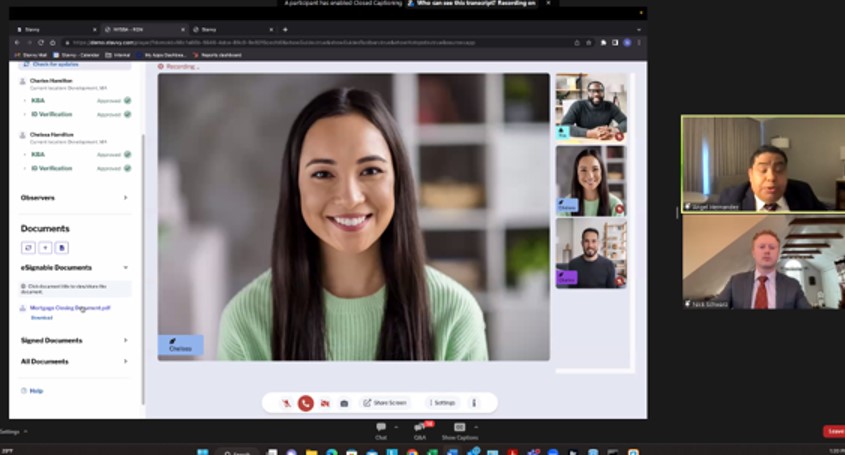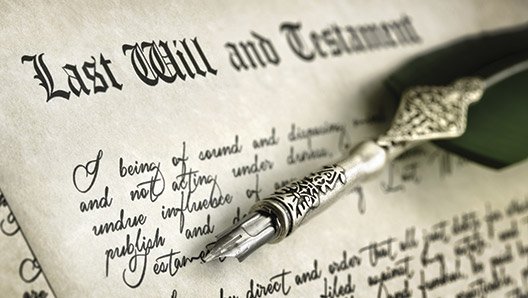The Future Is Here: New York Approves Remote Online Notarization
4.11.2023

You have a client in Europe who needs to sign a document before a notary public. Generally, you would instruct your client to appear before the United States Embassy for notarial services similar to the functions of a New York notary public.
What would happen if your client was in a country where there is no U.S. consulate? Or a country with a closed consulate – like Ukraine? Until recently, to have a document notarized your client would have to travel either to New York or a neighboring country with a U.S. consulate. Now, with the passage of New York Executive Law Section 135-c, a licensed New York electronic notary public may remotely notarize a signature wherever your client may be – New York, California, the world or the International Space Station.
There are many benefits to this new law. Since remote online notarization (RON) eliminates travel requirements, RON offers a workable “stay at home” solution, reduces errors and papers costs in loan closing documents and allows delivery of the executed documents by email – avoiding loss, destruction and wasted time. Since a New York notary public electronically notarizes the document, an attorney also avoids the inconvenience of having to provide a certificate of conformity to record an out-of-state document.[1]
Electronic Licensing Requirements
Executive Law Section 130 sets forth the “traditional” requirements to notarize a document in New York. Generally, a client physically appears, produces identification and signs his or her name before the notary. The notary then “stamps” a registration number and expiration date and ink-signs the document.[2]
Not long ago, and as a result of the COVID-19 pandemic, then-Governor Andrew M. Cuomo issued an executive order allowing a New York notary public to officiate remote notarization of a document.[3] During a video conference, the individual signing the document (the principal)[4] presented a photo identification, signed and immediately delivered the document to the notary public who “stamped” and ink-signed the copy. Although convenient, this notarization procedure was temporary and is no longer legal.
With the passage of Executive Law Section 135-c, New York has a true electronic notarization statute. The new law does not allow a traditional notary public to provide electronic notarization services. Instead, an attorney must apply for a separate license.[5] To obtain the license, the attorney must create or log into an existing New York Business Express account.[6] After answering a series of online questions, uploading a signed oath of office and paying the $60 fee, the secretary of state will issue a commission for an attorney to act as an electronic notary public. Similar to a traditional notary, an electronic notary’s registration number must be renewed every four years. It is noteworthy that an electronic notary may provide both electronic and traditional notary services.
Identity Verification and Credentialing Analysis Provided by a Third-Party Vendor
Thanks to the pandemic, New York attorneys began to use and rely on third-party platforms such as Zoom© or Microsoft Teams© for video conferencing. Unfortunately, the new law and regulations require additional security protocol for remote online notarizations, making traditional videoconferencing platforms unworkable.
Under the regulations, an electronic notary must use a third-party vendor to provide video conferencing that allows for “identity verification” and “credentialing analysis.”[7] Identity verification “means the use of an authentication process by which a notary public validates the identity of any principal and/or individual present for a notarial act.”[8] Credentialing analysis “means a process or service . . . through which a third-party affirms the validity of government-issued identification through review of public and proprietary data sources.”[9]
The regulations also require the electronic notary to “use only those vendors or providers who comply with the standards outlined in this Part and any communication or reporting relating to those standards as required by the secretary of state.”[10] Presently, the standards as required by the secretary of state are specific and technical. For example, a third-party video provider “must meet at a minimum, the Identity Assurance Level 2 standard as outlined in the Digital Identity Guidelines of the National Institute of Standards and Technology . . . document SP 800-63-3, Revision 3, dated June 2017 and includes updates as of 03-02-2020. . . . ”[11]
The regulations require the third-party provider to present “evidence to the online notary public of the provider’s ability to satisfy requirements set forth in this rule.”[12] Consequently, the secretary of state places responsibility on the electronic notary to choose a suitable third-party provider that will provide proper identity verification and credentialing analysis.[13]
Unlike New York, most states having remote online notarization require the secretary of state (not the notary) to approve the third-party provider. The secretary of state’s authorization procedure is either through “self-certification” or “application and certification.” Self-certification is when the secretary of state approves a third-party provider that files a certification of compliance.[14] The application and certification model is when the secretary of state actively reviews and then approves a third-party provider’s application.[15] It is unfortunate that New York utilizes neither standard – instead placing the obligation on the electronic notary.
Electronically Notarizing and Filing a Document
Although regulations are complicated, the procedure to electronically notarize a document is fairly simple. Using a third-party provider, the electronic notary sends a link to the principal. The principal then signs into the third-party provider’s platform where the electronic notary confirms audio and video capabilities. The electronic notary then requests identity verification through a link that would allow the principal to upload a copy of his or her driver’s license or such other proof of identity. The third-party vendor then electronically verifies the identification, and the electronic notary compares the identification picture to the principal’s likeness on the computer screen.
To sign the document, an electronic copy (generally in .pdf format) is provided to the principal who then consents to an electronic signature. The notary then witnesses the principal’s signature and then electronically signs and stamps the document. All signatures and stamps are generated by the third-party provider.
Although the principal may be located anywhere, the electronic notary must be physically located in New York when electronically notarizing a document.[16] When a principal is located outside the United States, he or she must verify “that the record or subject of the notarial act: (i) is to be filed with or relates to a matter before a public official or court, governmental entity, or other entity subject to the jurisdiction of the United States; or, (ii) involves property located in the territorial jurisdiction of the United States or involves a transaction substantially connected with the United States.”[17]
Once a document is electronically executed or notarized, it may be printed and mailed, or emailed, faxed or electronically transmitted to any person or place. However, to record an electronically signed document, an electronic notary must “paper out.” Papering out is when the individual who performed the remote online notary service executes a certificate of authenticity that substantially sets forth the following:
“On this …… day of …… in the year ……, I certify that the signature page of the attached record (entitled ……) (dated ……) is a true and correct copy of the signatures affixed to an electronic record printed by me or under my supervision. I further certify that, at the time of printing, no security features present on the electronic record indicated any changes or errors in an electronic signature in the electronic record after its creation or execution”
The certificate of authenticity must be ink-signed by the notary, include his or her title, official stamp or registration number, and the expiration date of the notary public’s commission.[18] A county clerk, city registrar or other recording officer must accept for recording a tangible copy of an electronic record so long as it is filed with an original certificate of authenticity.[19]
An electronic notary may only charge a fee of $25 “for each electronic notarial act performed, which shall be inclusive of all costs incurred by the notary public.”[20] Since the fee is inclusive of all costs, an electronic notary may not pass to the principal the cost incurred to retain a qualified third-party vendor. However, since the $25 is for each notarial act, an electronic notary may charge for each promissory note, mortgage and affidavit notarized during one session with the principal. Furthermore, an electronic notary may charge an additional $2 for each certificate of authenticity.
Recording and Recordkeeping
Before the new law, New York did not have a statute, regulation or executive order requiring a notary public to maintain a journal.[21] New regulations now require all notary publics (including attorneys) “to maintain records sufficient to document compliance with the requirements of sections 130 and 135-c of the Executive Law. . .”[22]
For a traditional and electronic notary public, a log, journal or ledger must be maintained that includes the date, time, verification process (e.g. driver’s license) and the type of notarial act performed.[23] An electronic notary’s log must also include the identity of the third-party provider.[24]
The log, journal or ledger may be kept in paper or electronic format such as a Microsoft Excel© spreadsheet. If the recordkeeping is stored using a third-party, the electronic notary must use a password or other secure means for authentication or access.[25]
The notary public must maintain all records for a minimum of 10 years.[26] For an electronic notary, the third-party provider must be able to record and archive the audio-video communication. This electronic file must be maintained by the notary public for a period of at least 10 years from the date of the transaction.[27] Many attorneys have complained that the 10-year recordkeeping requirements are overly burdensome and, as officers of the court, attorneys should be exempt from the regulation.
Conclusion
The public’s anxiety concerning electronic notarization is unfounded and will wane over time. Compared to a traditional notary, since an electronic notary must use a qualified third-party vendor, remote online notarization has better safeguards to detect fake identification documents. Furthermore, the odds of a fraudulent transaction or an individual signing under duress is greatly reduced since there is a video-audio recording that is saved for 10 years.
Accordingly, it would benefit a New York lawyer to become thoroughly knowledgeable about remote online notarization. In the last several years, use of Mortgage Electronic Registration Systems electronic promissory notes increased well over 100%.[28] Pursuant to a recent American Land Title Association survey, 62% of companies offering remote online notarization believe that there will be an increase over the next year.[29]
Forty-three states have some form of a remote online notarization law. On Feb. 27, 2023, the House passed H.R. 1059, the Securing and Enabling Commerce Using Remote and Electronic (SECURE) Notarization Act of 2023. The U.S. Senate has a similar bill.[30] If proposed legislation becomes a federal law, the SECURE Notarization Act would provide meaningful relief to America’s homeowners and prospective buyers by allowing immediate, nationwide use of remote online notarization technology.[31]
Michael A. Markowitz is a NYSBA vice president for the 10th Judicial District, chair-elect for the General Practice Law Section, and a member of the Task Force on Notarization. His office is located in Hewlett, New York, where he practices contract, probate, and real property transaction and litigation.
[1] N.Y. RPL § 299-a (for filing purposes, an acknowledgment or proof if taken in the manner prescribed by a sister state, District of Columbia, territory, possession, dependency, or other place, must be accompanied by a certificate to the effect that it conforms with such laws).
[2] See 19 N.Y.C.R.R. § 182.3.
[3] Generally see N.Y. Executive Order 202.7.
[4] 19 N.Y.C.R.R. § 182.2(p).
[5] N.Y. Executive Law § 135-c(3).
[6] See https://www.businessexpress.ny.gov.
[7] 19 N.Y.C.R.R. § 182.2.
[8] 19 N.Y.C.R.R. § 182.2(g).
[9] 19 N.Y.C.R.R. § 182.2(h).
[10] 19 N.Y.C.R.R. § 182.4(2).
[11] See 19 N.Y.C.R.R. § 182.7.
[12] 19 N.Y.C.R.R. § 182.6.
[13] 19 N.Y.C.R.R. § 182.8.
[14] See, e.g., Florida Statute 117.295(4)(a).
[15] See, e.g., Colorado Regulation 8 CCR § 1505-11-5.
[16] 19 N.Y.C.R.R. § 182.4(3).
[17] 19 N.Y.C.R.R. § 182.4(9).
[18] N.Y. Executive Law § 135-c(6)(d)(iii).
[19] N.Y. Executive Law § 135-c(6)(d)(ii).
[20] 19 N.Y.C.R.R. § 182.11.
[21] Michael L. Closen & Charles N. Faerber, The Case That There Is a Common Law Duty of Notaries Public to Create and Preserve Detailed Journal Records of Their Official Acts, 42 J. Marshall L. Rev. 231, 281 (2009).
[22] 19 N.Y.C.R.R. § 182.9(a).
[23] Id.
[24] Id.
[25] Id.
[26] 19 N.Y.C.R.R. § 182.9(b).
[27] 19 N.Y.C.R.R. § 182.8.
[28] Kelsey Ramirez, MERS eNotes Increase 261% in December, Housing Wire, Jan. 29, 2021, https://www.housingwire.com/articles/mers-enotes-increase-261-in-december.
[29] RON Use Projected to Increase in 2022, ALTA Blog, Sept. 28, 2022, http://blog.alta.org/2022/09/ron-use-projected-to-increase-in-2022.html.
[30] Roslyn Layton, Remote Online Notarization is Key to Improving Government Efficiency, Forbes, Dec. 13, 2022, https://www.forbes.com/sites/roslynlayton/2022/12/13/remote-online-notarization-is-key-to-improving-government-efficiency.
[31] Olive Morris, House Passes Remote Online Notarization Legislation, National Association of Realtors Washington Report, Feb. 28, 2023, https://www.nar.realtor/washington-report/house-passes-remote-online-notarization-legislation-2023.






